| Srl | Item |
| 1 |
ID:
133411
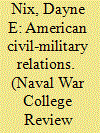

|
|
|
|
|
| Publication |
2012.
|
| Summary/Abstract |
Samuel P. Huntington died in December 2008, but this Harvard academic continues to have a significant impact on the conduct and state of American civil-military relations. Mackubin Owens's recent US Civil-Military Relations after 9/11: Renegotiating the Civil-Military Bargain and Suzanne Nielsen and Don M. Snider's 2009 edited work American Civil-Military Relations: The Soldier and the State in a New Era both challenge and contextualize Huntington's work for contemporary theorists and practitioners of civil-military relations. This is indeed a worthwhile effort, as America's civil-military relations have received much "airtime" over the past few years. General Stanley McChrystal's seeming challenge to the political leadership over proposed Afghanistan troop levels, Lieutenant Colonel Andrew Milburn's Joint Force Quarterly article challenging traditional conceptions of civilian control, and Bob Woodward's revelations in Obama's War regarding the 2009 tensions between the Pentagon and the administration over Afghanistan strategy highlight the relationship between the military and our civilian leaders while raising the issue of the military's participation in political discourse.
|
|
|
|
|
|
|
|
|
|
|
|
|
|
|
|
| 2 |
ID:
138610
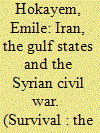

|
|
|
|
|
| Summary/Abstract |
An essential driver of the Syrian civil war has been the involvement of Iran, Saudi Arabia, Qatar and, to a lesser extent, the United Arab Emirates in every aspect of the struggle. Their role has influenced the calculations, positioning, behaviour and fortunes of the principal Syrian players. Irrespective of whether the effect was intended, this regional competition has revealed and deepened the many fault lines that cross Syrian politics and society. It has also exacerbated the polarisation of the Middle East.
|
|
|
|
|
|
|
|
|
|
|
|
|
|
|
|
| 3 |
ID:
130796
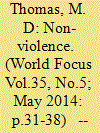

|
|
|
|
|
| Publication |
2014.
|
| Summary/Abstract |
Ethics and Indian civilization, political thought; global implication is a valid search into the global implications of the ethics grounded in the national ethos of the ideological, political, religious, social and cultural dimensions of the great civilization the word India stands for.
|
|
|
|
|
|
|
|
|
|
|
|
|
|
|
|
| 4 |
ID:
111052
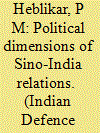

|
|
|
| 5 |
ID:
128219
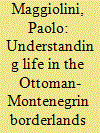

|
|
|
|
|
| Publication |
2014.
|
| Summary/Abstract |
The paper reconsiders the development of decentralization/centralization dynamics during the Ottoman Empire, focusing on the Ottoman-Montenegrin borderlands of Northern Albania with particular reference to the Mirdite territory inhabited by Catholic tribes. First, the paper describes the local socio-political system and balance of power in Mirdite territory before the enactment of the Gulhane decree. Secondly, the paper focuses on the developments and changes occurring in this land during the Tanzimat. Interaction, intertwining and overlapping between different strategies and policies are analysed in regard to the relationship between Catholic tribes, missionaries and Ottoman officials. Because of them, the changes and developments in the local administrative system occurring in both the religious and the political dimensions during the last part of the nineteenth century were expressions of the process of decentralization/centralization triggered by Istanbul from the third decade of the nineteenth century on.
|
|
|
|
|
|
|
|
|
|
|
|
|
|
|
|